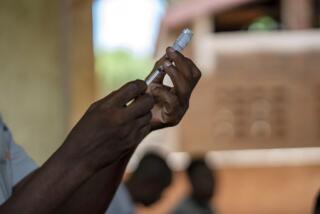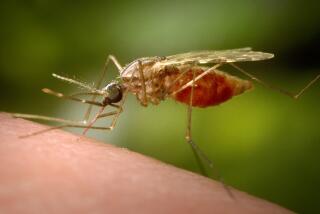U.N. Launches Joint Campaign to Fight Spread of Malaria
UNITED NATIONS — Four major U.N. agencies launched a joint effort Friday to combat the resurgence of malaria, which kills more than 1 million people a year--mostly African children--and has become the most deadly communicable illness in the world after tuberculosis.
Leaders of the agencies promised a broad attack on the disease, ranging from increased delivery of self-administered treatment kits and protective mosquito netting to tropical villages to stepped-up funding for vaccine research and satellite-assisted mapping of areas where malaria flourishes.
But they acknowledged that malaria has defeated past efforts at eradication and even has made a comeback in countries where it had been all but wiped out, including India.
Cases are on the rise in part because road-building, logging, mining, farming and irrigation projects are pushing into previously uninhabited areas that are infested with disease-carrying mosquitoes and because the parasite in the bloodstream that causes malaria has developed resistance to commonly used drugs, the World Health Organization said.
Malaria usually can be cured if diagnosed and treated quickly, but it is most prevalent in remote areas where people have no regular access to professional health care.
“It is above all a disease of the poor, killing the young and the weak,” WHO Director General Gro Harlem Brundtland said at a news conference. She added that malaria affects 300 million to 500 million people a year, 90% in sub-Saharan Africa, and kills 3,000 children a day.
Brundtland also emphasized the long-term economic impact of malaria, which saps the productivity of workers and has been blamed by the World Bank for causing a reduction of 1% or more in the gross domestic product in the countries of Africa. A single bout of malaria can cost African farm workers to lose as many as 10 working days at harvest time, when they are most at risk from the disease.
Because of increased travel, malaria has also reemerged in industrialized nations, including the United States. According to Dr. Lawrence Barat, an epidemiologist at the federal Centers for Disease Control and Prevention in Atlanta, between 1,000 and 1,200 cases are reported annually to the CDC, including three to five deaths.
All but a handful of cases in the United States involve people who caught malaria on an overseas trip and carried it home. Endemic malaria was virtually eliminated in the United States in the 1940s, Barat said, although there are still mosquitoes in the United States capable of transmitting the parasite.
Brundtland, a former prime minister of Norway who became leader of the Geneva-based WHO in July, has made the battle against malaria a top priority. But she has also recruited the three top U.N. economic development agencies--the World Bank, the U.N. Development Program and the U.N. Children’s Fund--to the cause. The heads of those three organizations joined Brundtland at Friday’s news conference.
The program will include increasing distribution of anti-malaria drugs and preventive devices such as bed nets with embedded organic insecticides. The risk of bites from malaria-infected mosquitoes is greatest after nightfall, and the treated bed nets are among the most effective preventive measures available. Tests in the African nations of Burkina Faso, Gambia, Ghana and Kenya showed that the nets reduced the mortality rate from malaria among children by as much as 25%, according to the United Nations.
The U.N. agencies will also encourage African governments to place a higher priority on fighting malaria and help them assemble anti-malaria programs; use satellite mapping to track the spread of the disease; integrate anti-malaria elements into U.N. economic assistance programs; increase World Bank funding for malaria control and research; and establish partnerships between government agencies and drug companies to support research into better treatments and development of a vaccine.
Brundtland and Dr. Tore Godal, a WHO expert in tropical diseases, said there has been little interest among drug companies since there is little profit in marketing drugs to the poor. Godal said the British firm SmithKline Beecham is the only company conducting trials on a potential vaccine for malaria.
WHO has budgeted almost $19.9 million for the program through 1999 but is seeking more money from U.N. member states. Britain recently pledged $90 million for the project, according to David Nabarro, a British health official who is scheduled to take over direction of the anti-malaria program at WHO in January.
More to Read
Sign up for Essential California
The most important California stories and recommendations in your inbox every morning.
You may occasionally receive promotional content from the Los Angeles Times.










